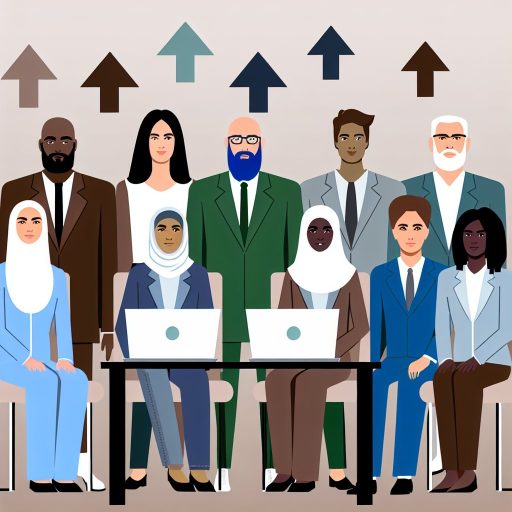Introduction
Public health social workers play a crucial role in addressing the needs of vulnerable populations.
This includes the elderly.
As the population continues to age, it is essential to focus on the unique health issues that affect older adults.
By understanding and addressing these health issues in aging populations, public health social workers can help improve well-being.
They also contribute to enhancing the quality of life for older adults.
It is important to recognize the significance of addressing health issues among the elderly.
This helps promote a healthier aging process.
Role of Public Health Social Workers
Public health social workers play a crucial role in addressing health disparities among aging populations.
These professionals are skilled in providing a wide range of services that contribute to the well-being of older adults.
Role of Public Health Social Workers in Addressing Health Disparities
- Public health social workers work to identify and address the social determinants of health that impact aging populations.
- They advocate for policies and programs that promote health equity and access to quality care for older adults.
- These professionals collaborate with interdisciplinary teams to develop comprehensive care plans that address the unique needs of aging populations.
Services Provided to Aging Populations
- Public health social workers conduct assessments to identify the social, emotional, and physical needs of older adults.
- They provide counseling and support services to help older adults cope with life transitions, loss, and chronic health conditions.
- These professionals connect aging populations to community resources such as healthcare providers, support groups, and housing assistance programs.
Importance of a Holistic Approach to Care
- Public health social workers recognize that the health of aging populations is influenced by multiple factors, including social, economic, and environmental conditions.
- By taking a holistic approach to care, these professionals address the interconnected needs of older adults to improve their overall quality of life.
- This approach ensures aging populations receive comprehensive support that enhances physical, mental, and emotional well-being.
Public health social workers play a vital role in promoting the health and well-being of aging populations.
They contribute through advocacy, support services, and a holistic approach to care.
By addressing health disparities and providing comprehensive care, these professionals significantly impact the lives of older adults.
Challenges Faced by Aging Populations
- Discuss common health issues faced by elderly individuals
- Socioeconomic factors impacting access to healthcare
- Mental health concerns among aging populations
As individuals age, they face a myriad of health challenges.
These challenges can impact their overall well-being and quality of life.
Here are some common health issues faced by elderly individuals:
Common Health Issues Faced by Elderly Individuals
- Chronic conditions such as arthritis, diabetes, and heart disease
- Cognitive decline and neurological disorders like dementia
- Mobility issues and falls leading to injuries
- Vision and hearing impairments
- Skin issues such as ulcers and infections
These health issues can be exacerbated by socioeconomic factors.
Socioeconomic factors impact access to healthcare services and resources.
Socioeconomic Factors Impacting Access to Healthcare
- Lack of health insurance coverage
- Financial constraints limiting affordability of medical care
- Transportation barriers to access healthcare facilities
- Inadequate access to nutritious food and medication
- Limited availability of geriatric specialists and services
In addition to physical health challenges, mental health concerns among aging populations are also prevalent.
These mental health challenges are often overlooked.
Mental Health Concerns Among Aging Populations
- Depression and anxiety due to loss of loved ones and social isolation
- Cognitive impairments leading to confusion and memory issues
- Increased risk of substance abuse and addiction
- Stigma surrounding mental health issues preventing seeking help
- Difficulty in coping with changes in lifestyle and roles
Public Health Social Workers play a crucial role in addressing these challenges faced by aging populations.
Transform Your Career Today
Unlock a personalized career strategy that drives real results. Get tailored advice and a roadmap designed just for you.
Start NowThey provide support, advocacy, and resources to promote overall health and well-being.
Learn More: Importance of Empathy in Substance Abuse Counseling
Strategies for Addressing Health Disparities
Importance of collaboration with healthcare professionals
Collaborating with healthcare professionals ensures a holistic approach.
This collaboration addresses the aging population’s health needs effectively.
Implementation of preventative care programs
Establishing preventative care programs helps in early detection of health issues.
These programs support better management of conditions among the elderly.
Advocacy for policy changes to improve healthcare access for the elderly
Advocating for policy changes leads to improved access to quality healthcare.
Such policies benefit aging populations significantly.
Community outreach and education
Conducting community outreach programs raises awareness about healthy aging.
Education campaigns play a critical role in informing the public.
Identifying and addressing social determinants of health
Recognizing social determinants such as housing and income is essential.
Addressing these factors helps reduce health disparities.
Culturally competent care
Providing culturally competent care respects unique values and beliefs.
This approach leads to better health outcomes for aging populations.
Integration of mental health services
Integrating mental health services addresses mental health issues among the elderly.
Mental health care is critical due to its high prevalence in this population.
Support for caregivers
Providing support and resources for caregivers is essential.
This support ensures the well-being of both elderly individuals and their caregivers.
By implementing these strategies, public health social workers can effectively address health disparities.
They also improve overall health outcomes of aging populations.
Transform Your Career Today
Unlock a personalized career strategy that drives real results. Get tailored advice and a roadmap designed just for you.
Start NowExplore Further: Probation Officer Interview Tips and Preparation
Cultural Competence in Working with Aging Populations
When working with aging populations as a public health social worker, it is crucial to have cultural competence.
Understanding diverse cultural backgrounds can greatly impact the quality of care provided to older adults.
Importance of Understanding Diverse Cultural Backgrounds
- Every culture has its own beliefs, values, and practices related to aging and healthcare.
- By being culturally competent, social workers can tailor their services to meet the specific needs of each individual.
- Cultural sensitivity fosters trust and rapport between social workers and aging clients.
- It ensures that interventions and care plans are respectful and reflective of each person's unique background.
Language Barriers and Communication Challenges
- Language barriers can hinder effective communication between social workers and aging clients.
- It can lead to misunderstandings, misinterpretations, and a breakdown in the therapeutic relationship.
- Communication challenges can also arise from differences in non-verbal cues and gestures.
- These barriers can affect the assessment of needs and the delivery of appropriate services.
Strategies for Providing Culturally Sensitive Care
- Employing language interpreters or translators to facilitate communication with non-English speaking clients.
- Respecting and valuing diverse cultural customs, traditions, and practices.
- Engaging in ongoing cultural competence training and education to enhance awareness and understanding.
- Collaborating with community organizations and cultural advisors to better serve aging populations.
Cultural competence plays a vital role in the work of public health social workers with aging populations.
By actively addressing cultural differences and embracing diversity, social workers can provide more effective and personalized care to older adults.
You Might Also Like: Trends in Rehabilitation Counseling Research

Impact of Social Determinants of Health
Understanding the impact of social determinants of health on aging populations is crucial.
These determinants influence the unique needs of this demographic.
Social determinants are the conditions in which people live, work, and age.
These factors have a strong influence on health outcomes.
- Discussion on the influence of social determinants on health outcomes: Social determinants play a significant role in shaping the health and well-being of aging populations.
- Factors such as income, education, access to healthcare, and social support affect the outcomes of older adults.
- Housing, transportation, and access to resources affecting elderly individuals: Adequate housing and transportation options are essential for health and well-being.
- Lack of suitable housing or reliable transportation can lead to social isolation and limited healthcare access.
- Importance of addressing social determinants in healthcare interventions: Healthcare must consider social determinants that influence health outcomes.
- By addressing housing insecurity, transportation barriers, and limited resource access, providers improve health for older adults.
Public health social workers need to assess social determinants in their practice.
They help older adults maintain independence, quality of life, and overall health.
A holistic approach to healthcare interventions supports well-being among aging populations.
Explore Further: Youth Worker Certification: Requirements and Benefits
Case Studies and Success Stories
As public health social workers continue to address the unique needs of aging populations,
there have been numerous successful programs and interventions that have made a positive impact on the health and well-being of elderly individuals.
Examples of successful programs targeting the health needs of aging populations
- Community-Based Health Promotion Programs: These programs focus on promoting healthy aging through education, exercise, and access to healthcare services.
- Home Care Services: Providing in-home care services allows elderly individuals to age in place while receiving the support they need.
- Telemedicine: Remote healthcare services have become increasingly important in reaching elderly populations, especially during the pandemic.
- Nutrition Assistance Programs: Ensuring access to nutritious meals can greatly impact the physical health and well-being of aging individuals.
Positive outcomes of interventions by public health social workers
- Improved Access to Healthcare: Social workers help connect elderly individuals to necessary medical services and resources.
- Enhanced Social Support: Social workers create networks of support for elderly individuals, reducing feelings of isolation and loneliness.
- Increased Quality of Life: Through personalized care and interventions, social workers enhance the overall well-being of aging populations.
- Decreased Healthcare Costs: By addressing the social determinants of health, social workers help prevent costly medical interventions.
Impact of personalized care for elderly individuals
One success story involves a 75-year-old woman named Evelyn who was living alone and struggling with chronic health conditions.
A public health social worker conducted a comprehensive assessment of Evelyn’s needs and developed a personalized care plan to address her physical, emotional, and social needs.
Through regular home visits, medication management, and coordination of community resources, Evelyn’s health significantly improved.
She reported feeling less isolated and more supported.
Transform Your Career Today
Unlock a personalized career strategy that drives real results. Get tailored advice and a roadmap designed just for you.
Start NowThe personalized care approach enhanced Evelyn’s quality of life and reduced her reliance on emergency medical services.
This ultimately led to cost savings for the healthcare system.
Another case study highlights the impact of a community-based exercise program for elderly individuals.
Through partnerships with local senior centers and healthcare providers, public health social workers organized regular exercise classes tailored to aging populations.
Participants reported improved mobility, strength, and mental well-being as a result of the program.
Furthermore, the social aspect of the classes provided opportunities for social connection and emotional support.
This contributed to overall positive health outcomes.
Public health social workers play a crucial role in addressing the health needs of aging populations through personalized care, community programs, and social interventions.
By highlighting successful case studies and success stories, we see the significant impact of their work in improving elderly individuals’ well-being and promoting healthy aging within communities.
Role of Public Health Social Workers in Addressing Health Disparities Among Aging Populations
Public health social workers play a crucial role in addressing health disparities among aging populations.
They provide support, advocacy, and resources to elderly individuals.
Their efforts help improve the well-being of older adults.
It is important to recognize the value of public health social workers in promoting health for aging populations.
Their dedication helps elderly people live healthier and happier lives.
This commitment should be acknowledged and supported by society.
We must continue to advocate for the needs of elderly individuals.
Ensuring they receive proper care and attention remains essential.
Prioritizing the health of aging populations is a moral imperative and societal responsibility.
By working together and supporting relevant initiatives, we can create a more inclusive society.
This society will value and respect the contributions of older generations.
Transform Your Career Today
Unlock a personalized career strategy that drives real results. Get tailored advice and a roadmap designed just for you.
Start NowLet us commit to advocating for the rights and dignity of aging populations.
We must ensure they receive the care and support needed to thrive.
Additional Resources
Our Epidemic of Loneliness and Isolation
Projected employment growth for community and social service …




